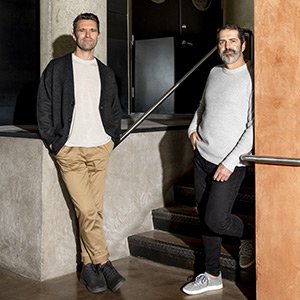Special Report: No future without digital – Allbirds: an exemplary case study The - Première Vision Paris

Allbirds: an exemplary case study
Famous for its pioneering use of wool to make sport shoes, Allbirds sneakers conquered the US – with fans from Barak Obama to Leonardo Dicaprio and Ryan Gosling – before heading out to conquer Europe. Here, a breakdown of the exemplary success of this DNVB born in 2016 in San Francisco.
Simple and high-impact message and products
A former professional footballer long sponsored by sports brands, Tim Brown gradually grew tired of showy colors and logos, and was bothered by the lack of any true ecological commitment in the sport footwear industry. In 2016, he decided to propose something new, and created Allbirds, based on an idea as simple as it is impactful: shoes with a clean design and no logo, made from outstanding New Zealand wool – soft, washable, 100% eco-friendly – and an ultra-light sole. The shoes also incorporates eucalyptus fibers (which use 95% less water than most textiles, with half the carbon footprint). The soles are made from sugar cane foam, the laces from recycled plastic bottles. The sneakers are meant to be environmentally friendly but also comfortable to wear. Time Magazine called them, ” the world’s most comfortable shoes”.
A business based on digital technology.
After producing 200 prototypes, Tim Brown launched a campaign on Kickstarter (a US crowdfunding company), which led to nearly 1,000 orders in four days. At the same time, he met Joey Zwillinger, a cleantech entrepreneur, who decided to join the adventure. They teamed up, setting up offices in Zwillinger’s hometown of San Francisco, and in 2016 launched their “direct to customer” brand, with exclusively online sales. This model means they can consistently interact with customers and address what they want without waiting for the end of a season. Runners, one of the brand’s iconic models, has seen multiple improvements since its launch in terms of design, durability and materials. All this is made possible by a strong social media presence, which allows Allbirds to stay in constant touch with its community.
And a successful transition to a physical presence.
In 2017, after fully reaping the benefits of e-commerce, Allbirds began opening its own stores, which, according to Brown, have irreplaceable advantages. They enable sales and marketing, since customers come in to buy the products as well as to learn about the materials and, more globally, the brand’s values. The Allbirds philosophy permeates the entire customer relationship thanks to the solid training of its sales staff. Tim Brown firmly believes that the success of a store depends on the quality of the experience for the buyers, which is a measure of the well-being and dedication of the sales staff. As Warby Parker founder Neil Blumenthal noted, “Retail isn’t dead; only mediocre retail is dead.”
Ongoing, sustainable innovation.
Allbirds obtained B Corp certification in 2016 and announced in 2019 that it was working to become a carbon neutral brand. In February 21, the brand invested $2 million in Natural Fiber Welding – a startup specialized in natural polymers – to bring to market a 100% plant-based leather made with vegetable oil, natural rubber and other organic ingredients. The first shoes made from this new material should be launched at the end of this year – and may represent a new source of growth for a company now valued at $1.4 billion.
More from our Special Report: No future without digital:

See our interview with writer and journalist Sophie Fontanel
